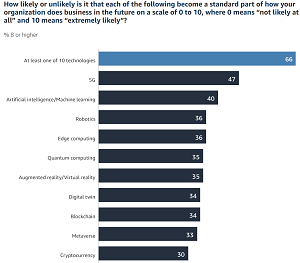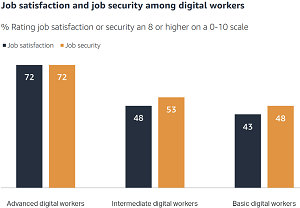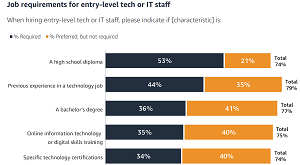News
Digital Skills Hiring: Orgs Say 5G, Crypto & Metaverse 'Here to Stay'
As if organizations didn't have enough workforce worries amid a crippling digital skills gap, a new study indicates they also have to deal with acquiring talent for emerging technologies that they expect to become industry standards.
That's because new tech like 5G wireless, cryptocurrencies and the metaverse "are here to stay," says the recent "AWS Global Digital Skills Study" published by Amazon Web Services (AWS), based on surveys conducted by Gallup.
The study of more than 30,000 workers and 3,000 hiring managers across 19 countries, using data collected in August, says it examines the economic benefits of a tech-savvy workforce, and indeed finds multiple benefits.
"The results consistently show that digital skills provide immense economic value to businesses and workers worldwide, raising gross domestic product (GDP), revenue growth, innovation, wages, job security and job satisfaction for businesses that integrate these technologies and the workers who acquire the needed skill sets," AWS said. "While both workers and organizations cite strong interest in digital skills training, companies around the world are struggling to fill vacant jobs that require these skills."
But then there are the obstacles to acquiring those digital skills on both the part of individual workers and enterprises.
"Gallup also found a number of practical obstacles to hiring digital workers, including a notable disconnect between how much employers say they value non-degree credentials, such as industry certifications, and their actions when evaluating candidate resumes," AWS said. "Specifically, the study found a self-imposed skills gap in technology job requirements, wherein employers are slightly more likely to prefer or require a bachelor's degree than they are to prefer or require digital skills certifications, despite the fact that managers give greater hiring preference to candidates with digital certifications than they do to candidates with a non-computer science bachelor's degree."
Indeed, Virtualization & Cloud Review has reported on study after study that indicate the tech skills gap has been holding enterprises back for years, with no letting up.
But now, not to mention finding talent for data science, cloud tech like Kubernetes and more, organizations have to account for emerging, cutting-edge skills.
"5G, cryptocurrency and the metaverse are here to stay," the report said. "While most organizations already say hiring for the digital skills they need is a challenge, they also need to prepare for the hiring challenges of the future. When asked how likely it is that each of 10 emerging technologies -- including the metaverse, blockchain and artificial intelligence -- will become a standard part of their business in the future, 66 percent of employers say it is highly likely that at least one emerging technology will become part of their operations. More than half (53 percent) believe multiple technologies will become standard, and 13 percent say all 10 will be a part of their organization's business in the future."
 [Click on image for larger view.] Emerging Tech Becoming Standards (source: AWS/Gallup).
[Click on image for larger view.] Emerging Tech Becoming Standards (source: AWS/Gallup).
Other key takeaways from the report as presented by AWS include:
- Advanced digital skills raise global GDP by an estimated $6.3 trillion each year by boosting worker income and productivity. While most workers in the countries studied do not use advanced digital skills as part of their job, the income gains these workers garner scale to large national and global value. Advanced digital skills generate an estimated $4.2 trillion in annual GDP in the 19 countries included in this study and $6.3 trillion globally due to the income and productivity of these workers. When basic and intermediate digital skills are included, the total annual global value of digital skills comes to $18.5 trillion, which is approximately 12 percent of global GDP.
 [Click on image for larger view.] GDP Gains (source: AWS/Gallup).
[Click on image for larger view.] GDP Gains (source: AWS/Gallup).
- In addition to workers' economic gains, job satisfaction and job security also rise with digital skill proficiency. Workers who acquire advanced digital skills realize benefits beyond higher salaries. Nearly three out of four workers (72 percent) who use advanced digital skills at work express high job satisfaction, compared to less than half of workers who only use basic digital skills (43 percent). Importantly, this is true even after controlling for other factors that may influence job satisfaction, such as age, gender and level of education. Additionally, workers with advanced digital skills express higher confidence in their job security than those with basic digital skills (72 percent versus 48 percent).
 [Click on image for larger view.] Satisfaction & Security (source: AWS/Gallup).
[Click on image for larger view.] Satisfaction & Security (source: AWS/Gallup).
- Organizations that rely heavily on advanced digital skills, digital technologies and cloud technology realize success rates for revenue growth and innovation that are notably higher than businesses that use fewer digital skills. The employer survey shows that companies with high levels of digital skill utilization report annual revenues that are approximately 168 percent higher than companies that do not use digital skills after adjusting for the number of employees, country and sector effects. Highly digital organizations are also more likely to have brought an innovative new product to market between 2020 and 2022: 72 percent of organizations that employ advanced digital workers reported introducing a new product in the past two years, compared to 47 percent of organizations that employ basic digital workers.
 [Click on image for larger view.] New or Improved Products (source: AWS/Gallup).
[Click on image for larger view.] New or Improved Products (source: AWS/Gallup).
- Most organizations report hiring challenges related to roles requiring digital skills, yet many maintain rigid bachelor's degree requirements. Across the 19 countries studied, just 31 percent of workers with advanced digital skills held a bachelor's degree or postsecondary equivalent. Yet, among employers surveyed, 36 percent report that a postsecondary degree is required for even an entry-level job requiring digital skills. Likewise, analysis of international job vacancy data finds that just over half of jobs with digital skill requirements (51 percent) list a postsecondary degree preference.
 [Click on image for larger view.] Job Requirements (source: AWS/Gallup).
[Click on image for larger view.] Job Requirements (source: AWS/Gallup).
While we have reported earlier on various initiatives to address the crippling cloud skills shortage, Amazon used the report's publication to remind everyone that it's committed to investing hundreds of millions of dollars to provide 29 million people around the world with access to free cloud computing skills training by 2025. "The company is providing this free skills training through a range of AWS-designed programs, making the latest technical knowledge accessible to anyone who has ever considered a career in cloud computing," Amazon said.
About the Author
David Ramel is an editor and writer at Converge 360.